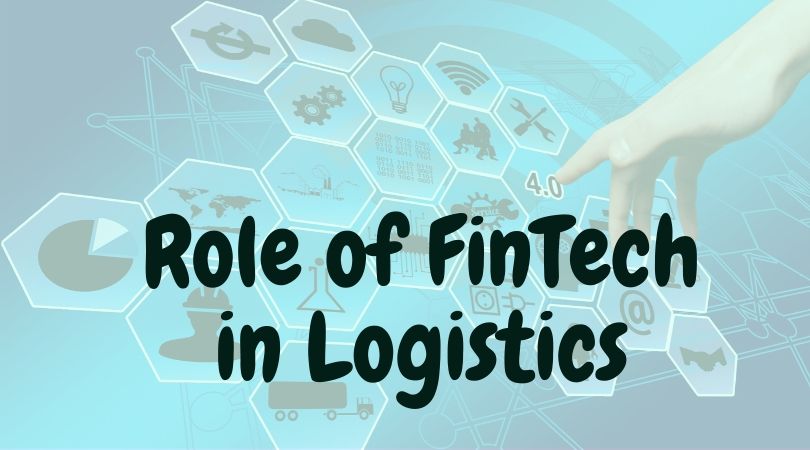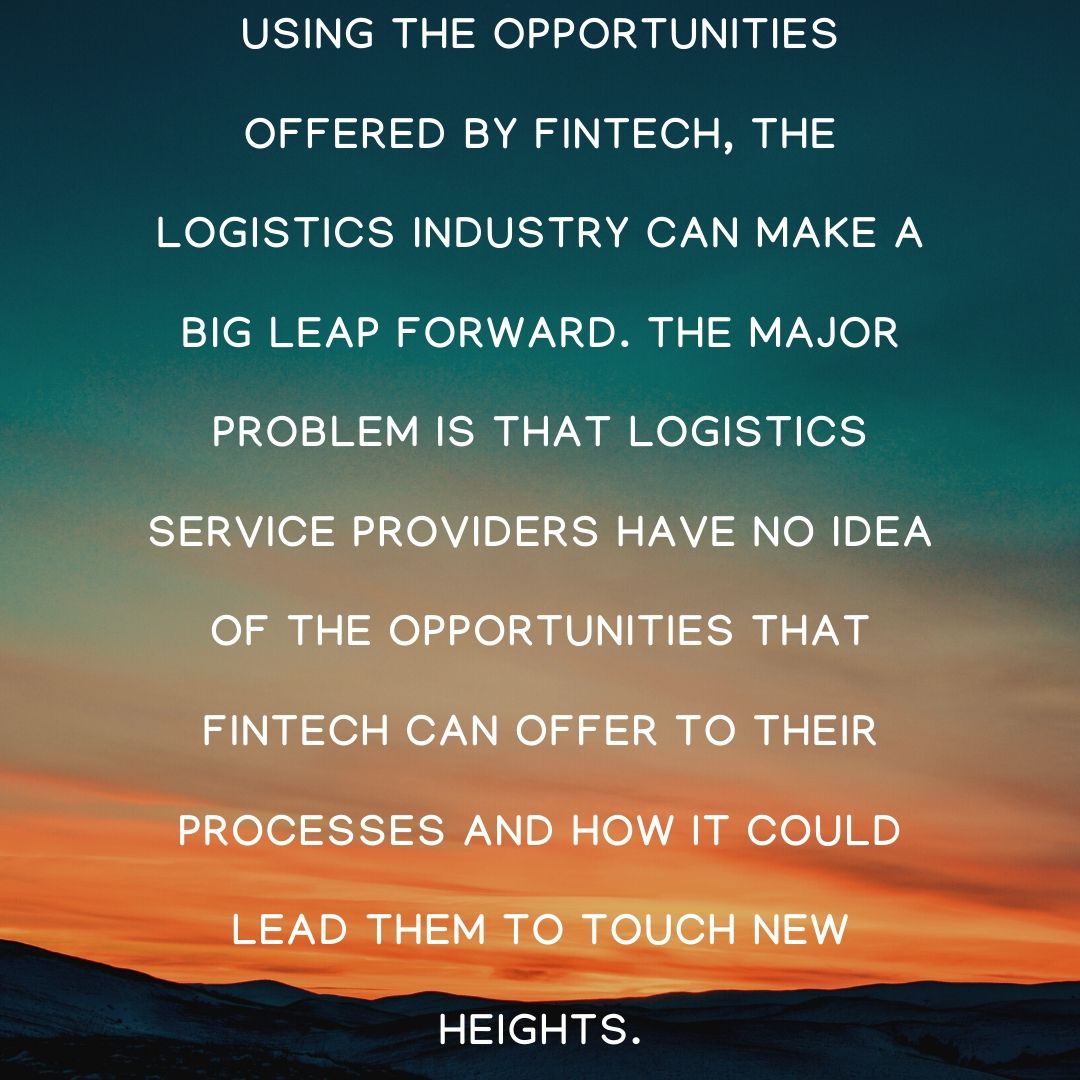Role of FinTech in Logistics and Supply Chain Management
- 22 March 2020 | 2111 Views | By Abhinav Mishra

As of 2019, the logistics sector generated US$4.5 billion in revenues (in the US) and is projected to annually grow by 15.6% until 2023, with potential market size of more than US$9 billion. The logistics sector plays a vital role in the country’s economy, as well as in nation-building. The world logistics industry is thriving and is on the cusp of a revolution. So, we can say there is a major role of FinTech in Logistics.
Logistics is a highly unorganized sector and opens many loopholes for startups to sweep in and create solutions. At the same time, financial technology is spreading its wings across all sectors. So when logistics meet fintech, it looks at streamlining the payment process involved in the sector.
Innovation is driven by startups and logistics giants with new perspectives and platforms. Traditionally, logistics used to focus only on the optimization of information and physical goods flows. Today the scenario has changed and the flow of transactions is recognized as an opportunity to add value in advanced logistics services.
In logistics industry information is often exchanged via paper documents, which involves manual signatures, retyping and stamps. Many logistics companies are still making use of legacy technology systems and lag behind the current state of the networked society. Compared to other industries, logistics data and transactions are not fully aligned with existing digital infrastructures like cloud software, smartphones, etc.
Using the opportunities offered by fintech, the logistics industry can make a big leap forward. The major problem is that logistics service providers have no idea of the opportunities that fintech can offer to their processes and how it could lead them to touch new heights.
Many logistics companies can reduce their working capital needs using a wide variety of financing options. There are many companies that struggle with their invoicing processes and payment methods. The logistics industry can gain by reducing the administrative hassle, improving insight in the financial processes, provide finance for equipment, and by speeding up payments. Let us see how fintech can change the logistics industry.
- Provision of working capital – In some supply chains some big creditworthy buyers are ready to support Supply Chain Finance arrangements for financing the net working capital of SME suppliers. In other supply chains, logistics companies can solve their capital needs through other solutions, often offered by fintech and banks.
- Optimizing administrative processes – A broad range of different solutions is available to optimize both order-to-cash processes and purchase-to-pay. Inefficient collaborations between supply chain partners can be improved by enhancing information about delivery for invoicing, approval processes, and digital connection between companies.
- Provide finance for equipment and inventory – The equipment required for logistics fulfillment is highly specialized and spreads around the globe. The need for warehousing and fulfillment also require tailor made solutions for insurance and financing. Fintech service can deliver asset specific or customer-specific financial arrangements based on the data about logistics processes, logistics assets, and operational risks. For example, two insurance companies use a specific technology to monitor the behavior of drivers and adjust insurance accordingly. For trucks, behavior based insurance is not yet available although the monitoring technology is used. With this, transport companies can train their drivers, reduce insurance premiums to be paid, reduce the costs of accidents and save on fuel.
- Facilitate international business, cross border movements and trust – It is a common fact that international supply chains are more complex than the regular supply chains since they have more number of participants, unknown customers, multiple jurisdictions, many customers authorities, and multiple tax regimes. The direct fintech solutions to international trade can come in the form of the digitization of documents and connecting operational, physical and financial information. More advanced solutions can also be found for the logistics industry in new ways of registering transactions in the complex logistics transaction. Dual filing in customs supervision could result in higher quality information, better cost, less uncertainty at the border, and time performance for the global logistics chain.
Let us look at the top four ways in which start-ups are using financial services to be a part of the ever-growing logistics industry.
Supplier Finance Management
Supply chain finance is a way of optimizing the cash flow in a business that allows one to fund early payments to the suppliers. For traditional logistics business owners, it is not an easy task to perform because of their existing setup but now startups are coming forward to make things easier for them and with this functioning of SMEs is becoming a lot easier.
At present, a lot of cross-border movement of goods happens on a daily basis and many supply chain parties are involved in the process and each has their own interests. The different parties in the process are shippers, carriers, forwarders, agents and customs, and inspection agencies. Each of these parties produces information and data. When goods move you need finance, guarantees, and insurance. Effective risk management is difficult for authorities as data does not come from the single source and the owner of the goods is often not visible at the moment of border crossing. This may result in more government inspections and increased cost in cross border trade.
This is where fintech companies come in to the picture. They are increasingly seeking and integrating supply chain data regarding shipment progress. By doing this, shippers are given accurate information on their supply chain by fintech companies.
Pay & Ship
With many irregularities in the logistics sector, receipt and bills often go missing or in some cases are unreported. Startups are offering many services now such as invoice management service which helps the business in the transportation sectors. Fintech startups are working for providing easy functioning by providing digital payments in this sector and automating the processes of producing bills and even acknowledging receipts.
Some startups are combining logistics and fintech to offer the same to e-commerce websites. Some startups are offering the pay as you go model, where the logistics company can not only track the shipment but also know the exact distance covered by the truck or carrier service and pay accordingly.
Blockchain in Logistics
Ever since blockchain has been introduced in fintech, companies are able to fit its use-cases everywhere. The most recent one is the logistics sector which is going to get a taste of the blockchain.
Startups across the globe have started implementing the technology for the supply chain finance. A Singapore based startup Skuchain has a product called Bracket which covers the A to Z of logistics, starting from placing the order to the processing of payments. In this process, it will maintain a transparent record.
With the transparency enabled by blockchain, a number of new financial models are possible to strengthen the supply chain. Financial transactions and payments can be initiated or triggered by events registered in the blockchain through a smart contract. For example, when a container arrives at the port of destination, the ocean carrier can be paid automatically by the forwarder or the terminal handling charges can be made to the carrier automatically by the consignee. The best part about this process is that payment is immediately visible and can trigger the release of the container by both the terminal and the carrier.
Automated Trade
With the advent of Artificial Intelligence, more and more companies in logistics have started automating the entire process. Following customer’s request, the logistics companies are planning and executing the automation process where even the payment processing is done at the click of a mouse which reduces a lot of hassle which happens in between.
The fintech has played a significant role in the modernization of logistics but there is still a long way to go. An industry driven development will successfully create crossovers between logistics and fintech.









